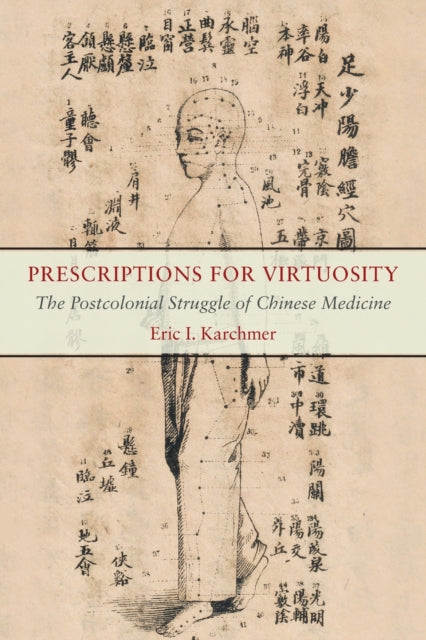Eric I. Karchmer
Prescriptions for Virtuosity: The Postcolonial Struggle of Chinese Medicine
Prescriptions for Virtuosity: The Postcolonial Struggle of Chinese Medicine
YOU SAVE £4.01
- Condition: Brand new
- UK Delivery times: Usually arrives within 2 - 3 working days
- UK Shipping: Fee starts at £2.39. Subject to product weight & dimension
Bulk ordering. Want 15 or more copies? Get a personalised quote and bigger discounts. Learn more about bulk orders.
Couldn't load pickup availability
- More about Prescriptions for Virtuosity: The Postcolonial Struggle of Chinese Medicine
Chinese medicine has faced threats from modern biomedicine, leading to changes in its clinical practice. Doctors have responded by emphasizing the unique "Chinese" characteristics of their practice and producing an ontological divide between the two medical systems. They have also found points of convergence to facilitate the blending of the two medical practices, producing innovative solutions to difficult clinical problems. Karchmer's book explores how the postcolonial condition can generate not only domination but hybridity, and how the clinical methodology of "pattern discrimination and treatment determination" can lead to an impoverished form of medicine in the hands of virtuoso physicians.
Format: Paperback / softback
Length: 272 pages
Publication date: 05 August 2022
Publisher: Fordham University Press
The assumption of Chinese medicine as a timeless healing tradition faces a significant challenge in the face of modern biomedicine. This encounter has led to a series of radical changes that have put the existence of Chinese medicine at stake. In response to this threat, Doctors of Chinese medicine have developed innovative strategies to maintain their clinical practice's relevance in contemporary Chinese society.
Prescriptions for Virtuosity, a comprehensive ethnographic and historical study, delves into the responses of these doctors to the global dominance of biomedicine. The book documents their strategies for navigating postcolonial power inequalities, highlighting two seemingly contradictory courses of action.
On the one hand, doctors have emphasized the unique "Chinese" characteristics of their practice, positioning them as distinct from the perceived strengths of biomedicine. This has created an ontological divide between the two medical systems, inadvertently marginalizing Chinese medicine. It has made it seem appropriate for clinical use only when biomedical solutions are lacking.
On the other hand, doctors have also sought points of convergence to facilitate the blending of the two medical practices. Through this approach, they have been able to produce innovative solutions to difficult clinical problems.
Prescriptions for Virtuosity explores how the postcolonial condition can generate not only domination but also hybridity. The book demonstrates, for instance, how the clinical methodology of "pattern discrimination and treatment determination" (bianzheng lunzhi), celebrated as the quintessential characteristic of Chinese medicine, is a twentieth-century invention. When subjected to the institutional standardizations of hospital practice, bianzheng lunzhi can lead to an impoverished form of medicine. However, in the hands of virtuoso physicians, it becomes a dynamic tool for moving between biomedicine and traditional Chinese medicine.
Through its rich analysis, Prescriptions for Virtuosity sheds light on the complex dynamics between modern biomedicine and traditional Chinese medicine. It highlights the challenges faced by doctors of Chinese medicine in maintaining their clinical practice while adapting to the changing healthcare landscape. The book offers valuable insights into the strategies employed by these physicians to preserve their tradition and adapt to the demands of contemporary society.
In conclusion, Prescriptions for Virtuosity is a groundbreaking work that provides a comprehensive understanding of the responses of doctors of Chinese medicine to the challenges posed by modern biomedicine. Through its ethnographic and historical research, the book offers valuable insights into the strategies employed by these physicians to maintain their clinical practice's relevance in contemporary Chinese society. It sheds light on the complex dynamics between modern biomedicine and traditional Chinese medicine, highlighting the potential for hybridity and innovation in the field. This book is a must-read for anyone interested in the intersection of medicine, culture, and power.
Dimension: 229 x 152 (mm)
ISBN-13: 9780823299836
This item can be found in:
UK and International shipping information
UK and International shipping information
UK Delivery and returns information:
- Delivery within 2 - 3 days when ordering in the UK.
- Shipping fee for UK customers from £2.39. Fully tracked shipping service available.
- Returns policy: Return within 30 days of receipt for full refund.
International deliveries:
Shulph Ink now ships to Australia, Belgium, Canada, France, Germany, Ireland, Italy, India, Luxembourg Saudi Arabia, Singapore, Spain, Netherlands, New Zealand, United Arab Emirates, United States of America.
- Delivery times: within 5 - 10 days for international orders.
- Shipping fee: charges vary for overseas orders. Only tracked services are available for most international orders. Some countries have untracked shipping options.
- Customs charges: If ordering to addresses outside the United Kingdom, you may or may not incur additional customs and duties fees during local delivery.


